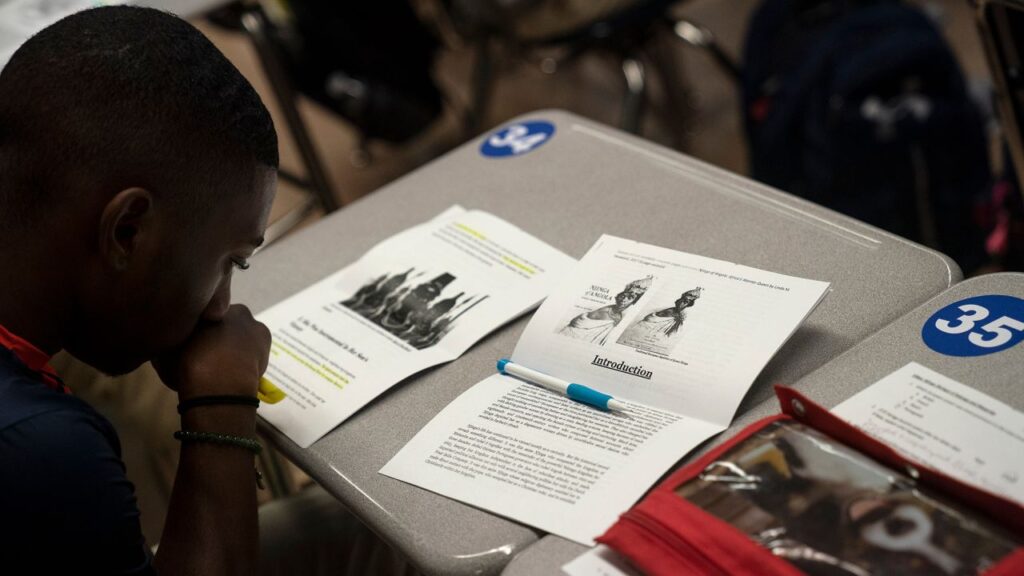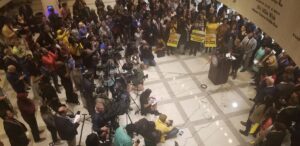Changes Made to African American Studies Course

Michael Robinson Chavez/The Washington Post/Getty Images
A student in Baltimore looks over his notes during an AP African American Studies course last year.
By Ryan Dailey
©2023 The News Service of Florida. All rights reserved; see terms.
TALLAHASSEE — After state education officials rejected an Advanced Placement African-American studies course, The College Board on Wednesday released a new framework that appears to have dropped content that drew objections from the state.
The Florida Department of Education last month sent a letter to The College Board, which developed the course, citing a list of topics and authors as a basis for the rejection.
State education officials essentially told The College Board that the course, a college-level class that would be offered to high-school students, would not be used in Florida classrooms unless changes were made.
In a news release Wednesday about the updated framework, The College Board said Florida’s objections were not taken into account when making revisions to the course.
“No states or districts have seen the official framework that is released, much less provided feedback on it. This course has been shaped only by the input of experts and long-standing AP principles and practices,” the organization said in a statement.
David Coleman, The College Board’s CEO, called the revised course “an unflinching encounter with the facts” and evidence of African American history and culture.
“No one is excluded from this course: the Black artists and inventors whose achievements have come to light; the Black women and men, including gay Americans, who played pivotal roles in the civil-rights movement; and people of faith from all backgrounds who contributed to the anti-slavery and civil-rights causes. Everyone is seen,” Coleman said.
A review of the updated framework, however, indicates that it does not include several topics that were called into question.
For instance, the state took issue with a topic that initially appeared in the course called “Black queer studies.” That topic, the state said, would have included required reading from author Roderick Ferguson.
The updated framework included no mention of Ferguson and did not have the overarching Black queer studies topic. Gov. Ron DeSantis last week specifically criticized the topic’s initial inclusion in the course.
“When you try to use Black history to shoehorn in queer theory, you are clearly trying to use that for political purposes,” the governor said.
DeSantis told reporters Wednesday that he had not seen the updated framework and declined to comment on changes.
The News Service of Florida sought comment Wednesday from the Department of Education after the framework’s release, but the department had not responded as of mid-afternoon.
Other topics such as “movements for Black lives,” “Black feminist literary thought,” “intersectionality and activism” and “the reparations movement” appeared to have been removed from the course.
However, one part of the framework that lists “sample project topics,” which are optional and not a required part of the course, listed possible political and policy debates including “reparations debates in the U.S./ the Americas.” The same list of optional debate topics included “Black conservatism: development and ideology,” and “intersectionality and the dimensions of Black experiences.”
Authors whose works were previously planned to be included in the course, but drew objections from the state, appeared to have been removed from the updated framework.
Angela Davis, who the state education department described as a “self-avowed Communist and Marxist,” did not show up in a search of the revised framework. Bell Hooks, who the department pointed to as an author of “many intersectionality texts,” also was not included in the updated course.
Changes drew an immediate rebuke from the Human Rights Campaign, a major LGBTQ civil-rights organization.
“Today, the College Board released a revised curriculum for its new Advanced Placement course in African American Studies, which attempts to erase Black history by stripping out the names of many Black writers and scholars associated with critical race theory, the Black queer experience, and Black feminism. Other topics, like the Black Lives Matter movement, are now optional,” the organization said in a news release.
Human Rights Campaign President Kelley Robinson called the revisions “censoring Black and queer history” and criticized DeSantis directly.
“We cannot cave to the will of extremist conservatives like Ron DeSantis who are trying to whitewash history and use the power of the government to punish, erase, or attack anyone he disagrees with, including the Black and LGBTQ+ communities,” Robinson said in a statement.
As DeSantis continues to target “trendy ideology” in Florida classrooms, The College Board included in an introductory part of the framework a statement of principles that said Advanced Placement courses do not seek to indoctrinate students.
“AP opposes indoctrination. AP students are expected to analyze different perspectives from their own, and no points on an AP Exam are awarded for agreement with any specific viewpoint. AP students are not required to feel certain ways about themselves or the course content. AP courses instead develop students’ abilities to assess the credibility of sources, draw conclusions, and make up their own minds,” said the section titled “What AP stands for.”








